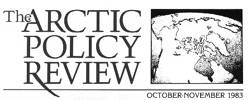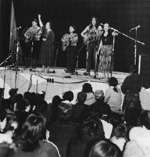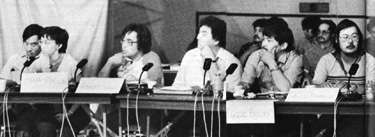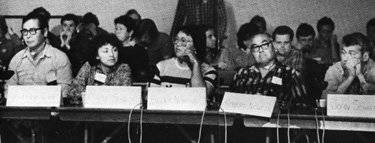
ICC RESOLUTIONS
1983
RESOLUTION 83-01
Inuit Circumpolar Conference Position on Nuclear Activity in the Arctic and Sub-Arctic Areas
WHEREAS, the Inuit Circumpolar Conference developed a fundamental policy restricting the Arctic and sub-Arctic to those uses which are peaceful and environmentally safe;
WHEREAS, this policy is reflected in the several resolutions adopted by the General Assembly and the Executive Council since the formation of the Inuit Circumpolar Conference in 1977;
WHEREAS, the governments of the United States and Canada intend to cooperate with each other to test the cruise missile in our northern Canadian homeland;
WHEREAS, the government of the United States has entertained the idea of basing the massive MX missile system in our Alaskan homeland;
WHEREAS, the Atomic Energy Canada, Ltd., plans to test the environmental and economic feasibility of the mini-CANDU and the SLOWPOKE 3 (small nuclear reactors for generating electricity) in the Canadian north since they are prohibited from testing them in the Canadian south due to environmental restrictions; and
WHEREAS, the Arctic and sub-Arctic shall not be used for any nuclear testing or as a nuclear dump-site;
NOW THEREFORE BE IT RESOLVED THAT the Inuit Circumpolar Conference emphatically restates its nuclear position:
1. that the arctic and sub-arctic be used for purposes that are peaceful and environmentally safe;
2. that there shall be no nuclear testing or nuclear devices in the Arctic or sub-Arctic;
3. that there shall be no nuclear dump=sites in the Arctic or sub-Arctic;
4. that exploration and exploitation of uranium, thorium, lithium or other materials related to the nuclear industry in our homeland be prohibited;
FURTHERMORE BE IT RESOLVED THAT the Canadian government be notified of our opposition to the testing of the cruise missile in our Canadian homeland and that they be requested to refrain from such tests;
FURTHERMORE BE IT RESOLVED THAT the Atomic Energy Canada, Ltd., be notified of our opposition to the testing of nuclear reactors in the Canadian Arctic or sub-Arctic and that they be notified to refrain from such tests;
FURTHERMORE BE IT RESOLVED THAT the United States government be notified of our opposition to the placement of the MX missile in our Alaskan homeland and that they be requested to cease with any such plan;
FURTHERMORE BE IT RESOLVED THAT the Inuit Circumpolar Conference study and research current international treaties to determine whether or note they comply with the Inuit Circumpolar Conference Arctic Policy; and
FURTHERMORE BE IT RESOLVED THAT the Executive Council of the Inuit Circumpolar Conference lobby the United Nations and various international organizations to encourage members of the United Nations to adopt a policy for a nuclear free zone in the Arctic.

The ICC Greenlandic Delegation from left to right: Karl Christian Olsen, Peter Samuelsen,
Pauline Olsen, Anders Berthelsen, Peter Ostermann

Themothaus Poulsen, Alibak Steenholdt, Jens Geisler, Jane Kleist, Karl Moeller, Pavia Nielsen, Avva Mathiassen, Ane Hansen, Gudrun Chemnitz, and Lars Godtfredsen. Not shown are Lars Chemnitz, Arkaluk Lynge, and Hans-Pavia Rosing.
RESOLUTION 83-02
Equal Representation of Women within the Inuit Circumpolar Conference
WHEREAS, in the tradition of our ancestors, both sexes were involved in dealing with the issues from time immemorial; and
WHEREAS, the Inuit Circumpolar women from Alaska, Canada, and Greenland based on sexual equality need representation at all levels, international, national, regional, and local; and
WHEREAS, there are not enough women represented during this Inuit Circumpolar Conference;
THEREFORE BE IT RESOLVED THAT the Inuit women of Alaska, Canada and Greenland, whenever possible, be guaranteed by each Member Party of the Inuit Circumpolar Conference equal representation within the Inuit Circumpolar Conference;
FURTHERMORE, BE IT RESOLVED THAT a Committee for the Status of Inuit Circumpolar Women be established under the Inuit Circumpolar Conference.
RESOLUTION 83-03
Soviet Inuit Participation within the Inuit Circumpolar Conference
WHEREAS, the Inuit Circumpolar Conference is an international Inuit forum;
AND WHEREAS, the purposes of the Inuit Circumpolar Conference are as follows:
1. to strengthen unity among the Inuit of the circumpolar region;
2. to promote Inuit rights and interests on the international level’
3. to ensure adequate Inuit participation in political, economic and social institutions which we Inuit deem relevant;
4. to promote greater self-sufficiency of the Inuit in the circumpolar region;
5. to ensure the endurance and the growth of Inuit culture and societies for both present and future generations;
6. to promote long term management and protection of arctic and sub-arctic wildlife, environment and biological productivity; and
7. to promote wise management and use of non-renewable resources in the circumpolar region and incorporating such resources in the present and future development of Inuit economics, taking in to account other Inuit interests.
AND WHEREAS, the Soviet Inuit are family members in the international Inuit community;
AND WHEREAS, the Soviet Inuit have a right to participate in international discussions and debates regarding issues that bear directly upon Inuit interests;
AND WHEREAS, the Inuit Circumpolar Conference has extended formal and informal invitations to the Soviet Union requesting Soviet Inuit participation in its proceedings;
AND WHEREAS, an apparent misunderstanding has prompted the Soviet government to deny Soviet Inuit the right to participate in the proceedings of the Inuit Circumpolar Conference;
AND WHEREAS, the Inuit Circumpolar Conference desires to promote harmonious relations among all circumpolar peoples;
AND WHEREAS, the Inuit of Canada, the United States, and Greenland acknowledge the right of the Soviet Inuit to participate in the Inuit Circumpolar Conference proceedings;
THEREFORE, THE INUIT CIRCUMPOLAR CONFERENCE hereby extends to the Soviet Inuit participatory rights to discuss and debate Inuit issues during its Executive Council meetings;
FURTHERMORE< THE INUIT CIRCUMPOLAR CONFERENCE hereby establishes special participatory status for the Soviet Inuit to discuss and debate issues of concern to the circumpolar Inuit community during its Executive Council meetings;
FURTHERMORE, this special participatory status for the Soviet Inuit shall remain in effect until the Soviet Inuit establish full official membership in the Inuit Circumpolar Conference;
FURTHERMORE, the circumpolar Inuit community, living under four national governments, desires that the national flag of the Union of Soviet Socialist Republics be displayed during all Inuit Circumpolar Conference General Assembly meetings;
AND FURTHERMORE, all Inuit Circumpolar Conference meetings shall be announced to the Soviet Inuit through the good offices of the Soviet Embassy in Ottawa, Canada.
RESOLUTION 83-04
Support of the Aleut people of Alaska with respect to the World War II commission created by the Carter Administration
WHEREAS, the Aleuts are one of the indigenous peoples of the earth;
WHEREAS, since 1867 the Aleuts became citizens of the United States of America as stipulated in the original Bill of Sale of Alaska to the United States of America’
WHEREAS, the Constitutional rights of the Aleuts were divests for no substantial reason during World War II and this was compounded by the fact that of the diverse population in the Aleutian and Pribilof Islands only Aleuts were removed;
WHEREAS, the removal of some of the Aleuts from their home islands to four locations in southeastern Alaska in 1942 caused the cessation of those removed Aleuts’ culture for approximately two and one half years;
WHEREAS, the damages and losses incurred infinitely surpassed those commonly calculated monetarily;
WHEREAS, the conditions these Aleuts were exposed to were horrific, acclimatization being the least;
WHEREAS, prior to their removal, the Attuans were imprisoned by the Japanese; the villages of Atka observed the demolition of their village by U.S. Naval gunfire; Amakanak and Unalaska Islands sustained two air attacks by the Japanese;
WHEREAS, during their absence their home islands were transformed into military fortresses thereby permanently damaging existing ecological systems, their homes and churches were vandalized by U.S. military personnel to the point in some cases making them unlivable or in severe disrepair;
WHEREAS, the authorities admit no viable plan was devised prior to removal, during the absence and before or after return of said Aleuts for in the least, creature comforts;
WHEREAS, the losses and damages incurred because of this experience were inhumane and are transferred from one generation to the next; we suffer in our efforts;
WHEREAS, the reparation demands are not unreasonable considering the scope and depth of said damages and losses;
THEREFORE BE IT RESOLVED THAT this organization known as the Inuit Circumpolar Conference support those recommendations of the World War II Commission enacted into law by the Carter Administration of the Government of the United States of America.
RESOLUTION 83-05
ICC Support of the Canadian Inuit efforts in constitutions work within the Canadian Government
WHEREAS, Canadian Inuit and other Aboriginal Peoples of Canada are in the process of negotiating further constitutional changes and the entrenchment of aboriginal rights, including rights of Inuit on the international level, in the Canadian Constitution with federal and provincial governments; and
WHEREAS, the process may take many years, suffer many delays and meet resistance from various parties to the process; and
WHEREAS, various Canadian government leaders have acknowledged the leading role being played by Inuit on behalf of all Canadian aboriginal peoples in this process of further constitutional changes; and
WHEREAS, this work is accomplishing significant advances in human rights and constitutional development and is therefore relevant to the peoples of many countries;
THEREFORE BE IT RESOLVED THAT the Inuit Circumpolar conference strongly support the initiatives of Canadian Inuit in this work;
BE IT FURTHER RESOLVED THAT the Inuit Circumpolar Conference acknowledge the efforts of the Canadian government and some provinces to promote constitutional change involving aboriginal peoples;
BE ITS FURTHER RESOLVED THAT the Inuit Circumpolar Conference call upon all peoples and countries to support the constitutional work taking place in Canada, and the international rights of Inuit;
BE IT FURTHER RESOLVED THAT the Inuit Circumpolar Conference disseminate information about this work in order to assist peoples undertaking similar efforts elsewhere in the world.

Edna MacLean, one of the authors of the resolution on Inuit Women,
delivers the report of the ICC Committee on Education, Culture, and Language.

LeDevoir correspondent Francois Bellemare, left, interviews Charlie Watt, co-chairman of
Inuit Committee on National Issues and Canadian candidate for ICC presidency.
RESOLUTION 83-06
Addressing Canadian Inuit Art
WHEREAS, Inuit art is recognized as an important aspect of Inuit cultural heritage; and
WHEREAS, Inuit art is recognized in the international community as a unique form of Canadian art; and
WHEREAS, the creation of Inuit art is one of the most important economic activities of most Inuit communities; and
WHEREAS, the devaluation of Inuit art has had a devastating effect on the fragile Inuit economy; and
WHEREAS, recent efforts by multi-national lobby groups has resulted in the banning of seal products by the European Community which has resulted in another severe blow to the Inuit economy; and
WHEREAS, the appearance of fake Unit art in large numbers of Canada has and will have the effect of devaluation of Inuit art both in terms of price and integrity; and
WHEREAS, this is not acceptable to Inuit; and
WHEREAS, the Board of Directors of Inuit Tapirisat of Canada recently passed a resolution calling on the Government of Canada to introduce immediate legislation to protect Inuit cultural heritage and the integrity of Inuit art;
THEREFORE BE IT RESOLVED THAT the Third General Assembly of the Inuit Circumpolar Conference requests the Government of Canada to introduce the desired legislation;
BE IT FURTHER RESOLVED THAT this assembly requests the Governments of the United States and Denmark to introduce similar measures in consultation with Inuit of these countries.
RESOLUTION 83-07
Protection of the Norton Sound, Bering Sea and Alaska Environment
WHEREAS, the Inuit Circumpolar Conference (ICC) is an international organization of Inuit people of Alaska, Canada and Greenland which is recognized as the voice of the Inuit in world affairs; and
WHEREAS, the ICC maintains, as a primary overriding goal, the development of sound arctic policies which shall serve to protect the Inuit way of life, Inuit culture, and including protection of the environment and biological resources throughout the Inuit homeland; and
WHEREAS, the Secretary of the Interior of the United States of America has conducted OCS Oil and Gas Lead Sale No. 57, in which the U.S. has sold rights to explore and develop oil and gas reserves underlying the Norton Sound region of the Bering Sea; and
WHEREAS, Norton Sound OCS Lease Sale No. 57 was conducted over the strenuous and unanimous objection of the 75 Inuit communities located on Norton Sound or along adjacent waterways, all of which are dependent upon the abundant biological resources associated with the Norton Sound environment; and
WHEREAS, the affected Inuit communities have expressed concern that insufficient information is available about the effects of oil and gas development, including effects of oil contaminants and acoustical pollution, upon marine mammals, including the bowhead and beluga whales, ogrook, and spotted seals and other seals, walrus, and other marine mammals upon which Inuit of the region are dependent; and
WHEREAS, Inuit of the Norton Sound region are seriously concerned about the affects of oil and gas development upon fisheries stocks of the area, including king salmon, silver salmon, sockeye and pink salmon, ling cod, whitefish, herring, tomahawked, trout, arctic char, pike, blackfish, grayling, and other salt and fresh water fish of the region; and
WHEREAS, Inuit of the region, together with members of the Alaska and U.S. scientific communities who are most expert in their knowledge of the behavior of the Norton Sound environment, have evidenced serious concern that insufficient knowledge exists about current and weather behavior in the Bering Sea, effects of oil contaminants upon deposit-feeding organisms, impacts of pollutants on Bering Sea sedimentology, effects of acoustical pollution from tankers, seismic boats, and other industrial activity associated with oil and gas exploration upon Norton Sound biological resources, and that the lack of such knowledge makes it impractical to permit a decision to develop Norton Sound offshore oil and gas reserves at the present time; and
WHEREAS, the local, indigenous inhabitants of the region are dependent upon land animals living in tidelands and coastal areas of Norton Sound which may be seriously affect by industrial contaminants, including moose, bear, beaver, caribou, reindeer, mink, otter, muskrats, rabbits, wolverine, fox, and other land animals, including migratory and indigenous waterfowl such as cackling, snow, Canadian, emperor and white-fronted geese, swans, numerous species of ducks, snipes, and sea birds, as well as abundant supplies of berries and edible plants located in adjacent tidelands; and
WHEREAS, neither the U.S. government nor the oil industry nor the State of Alaska has devoted significant effort to develop an adequate plan and necessary resources to monitor the status of the biological resources of Norton Sound, including Inuit inhabitants, during all phases of exploration and development to assure adequate protection against adverse impacts, and
WHEREAS, Inuit of the Bering Straits and Yukon-Kuskokwim regions surrounding Norton Basin have been sufficiently concerned that adequate technology currently exists to permit the safe extraction of oil from Norton Sound such that the affected Inuit communities joined together to seek an order from the U.S. courts to void the lease sale; and
WHEREAS, the Inuit Circumpolar Conference policy on OCS oil and gas development, as promulgated by the 1980 General Assembly meeting at Nuuk, Greenland, is that no offshore exploration should occur in coastal regions of the Inuit homeland;
THEREFORE BE IT RESOLVED THAT the 1983 General Assembly of the Inuit Circumpolar Conference meeting at Frobisher Bay, NWT, hereby calls upon the U.S. Government to give proper concern to the protection of the Inuit way of life in the Norton Sound, Bering Sea region by voiding leases sold in Oil and Gas OCS Sale No. 57; and
BE IT FURTHER RESOLVED THAT the 1983 ICC General Assembly hereby requests and authorizes the President and Executive Council of the ICC to take every appropriate opportunity to advocate the cause of the Bering Sea Inuit in seeking to have Norton Sound OCS Sale No. 57 voided; and
BE IT FURTHER RESOLVED THAT the ICC requests the assistance of appropriate international organizations, including but not limited to UNESCO, to establish a long term, comprehensive monitoring program throughout the circumpolar offshore areas to determine the effect of OCS oil and gas development on the Inuit way of life in Norton Sound, as well as throughout the arctic regions, including an ongoing effort to monitor the status of biological resources during all phases of OCS oil and gas development.
RESOLUTION 83-08
Inuit Circumpolar Conference to support plaintiffs in the lawsuit ICAS and UIC et al, vs. United States et al.
WHEREAS, the Inuit Circumpolar Conference supports the efforts of other Inuit organizations to obtain legal recognition and protection of Native rights in all areas used and occupied by the Inuit people, including water areas; and
WHEREAS, two Inuit groups based in the United States, namely, the Inupiat Community of the Arctic Slope (ICAS) and Ukpeagvik Inupiat Community (UIC), together with several Inuit individuals, have gone to the American federal court system to seek recognition and enforcement of Inuit rights in offshore areas used and occupied by the Inuit residing in that area, including offshore areas up to 60 miles from shore; and
WHEREAS, the above Inuit groups and individuals have sued the United States, the State of Alaska and several oil companies in the case known as ICAS and UIC et al. vs. United States et al., in the federal district court in Alaska, and have sought to intervene in United States vs. Alaska, a boundary dispute pending in the United States Supreme Court.
THEREFORE BE IT RESOLVED THAT, the Inuit Circumpolar Conference strongly supports the efforts of the Inuit plaintiffs in ICAS and UIC et al, vs. United States et al and the Inuit petitioner-interveners in United States vs. Alaska; and
BE IT FURTHER RESOLVED THAT the staff of ICC cooperate with ICAS, UIC, and their attorneys in the areas of information gathering research, formulation of strategy, and publicity.

Entertainment each night of the meeting packed the Elementary School auditorium.
RESOLUTION 83-09
Permanent Inuit Circumpolar Conference Elders Organization called the ICC Elders Conference
WHEREAS, pursuant to Inuit Circumpolar Conference Resolution Number 05-80, Inuit Elders from Alaska, Canada and Greenland have met together on July 25-31, in Frobisher Bay, NWT, Canada; and
WHEREAS, to further the purpose of Resolution 05-80 the Elders believe it is necessary that the Elders conference be constituted as a continuous permanent organization within the ICC so that the Elders’ task of transmitting their knowledge will be facilitated; and
WHEREAS, the organization of Elders has set its basis on the Preamble and Article 2 and 3 of the Inuit Circumpolar Conference; and
WHEREAS, the Elders Conference has unanimously agreed on an administrative organizational structure, which is attached to an included in this resolution; and
WHEREAS, to be effective, a permanent Elders conference will require adequate staff and funding;
THEREFORE BE IT RESOLVED THAT the Inuit Circumpolar Conference approves the creation of a continuous, permanent Elders Organization, to be called the ICC Elders Conference, within the ICC, for the purpose of furthering the aims of ICC Resolution 05-80; and
BE IT FURTHER RESOLVED THAT the staff of the ICC, and such funding as the General Assembly shall from time to time deem appropriate, shall be made available to the ICC Elders Conference to facilitate its endeavors.
RESOLUTION 83-10
Associate the Inuit Circumpolar Conference with the World Council of Indigenous Peoples
WHEREAS, the Inuit peoples of the Arctic recognize their solidarity with the struggles of other Native peoples throughout the world to achieve self-determination and the free exercise of their rights as guaranteed in the United Nations Declaration of Human Rights;
WHEREAS, the members of the Inuit Circumpolar Conference extend a special concern to those Native Peoples of Central and South America who are undergoing persecution and systematic elimination by agencies of their own governments;
WHEREAS, the World Council of Indigenous Peoples has been active in promoting the unity of Native Peoples throughout the world as the beset means of eliminating this oppression and reinforcing the strength of Native organizations;
WHEREAS, the Inuit peoples of the Arctic have sent their own representatives to the World Council of Indigenous Peoples since its inception at Port Alberny in 1975;
WHEREAS, the World Council of Indigenous Peoples has consistently supported the founding and organization of the ICC and the goals of its national memberships;
WHEREAS, the President of the WCIP, Jose Carlos Morales, has addressed our Third General Assembly in Iqaluit to offer his support and to invite us to attend the next World Assembly of Native Peoples to be held in Oaxaca, Mexico, in June 1984;
THEREFORE BE IT RESOLVED THAT by this Assembly that appropriate steps be taken by the ICC to associate this body with the World Council of Indigenous Peoples and that representation be sent to the World Assembly of Native Peoples;
BE IT FURTHER RESOLVED THAT the Inuit Circumpolar Conference seek appropriate means to offer aid and support to those native Peoples of Central and South America suffering the tribulations of war, persecution, and relocation.
RESOLUTION 83-11
World Council of Churches policy statement on “Land Rights for Indigenous Peoples.”
WHEREAS, the World Council of Churches is currently holding its Assembly in Vancouver, Canada, for the purposes of reviewing, ratifying and promoting various policy statements; and
WHEREAS, one policy to be discussed and voted upon at the W.C.C. meeting is entitled “Land Rights for Indigenous Peoples,” and
WHEREAS, this policy calls for the active support, both financially and morally, of the W.C.C. to work towards the further enhancement and further recognition of indigenous rights the world over; and
WHEREAS, the policy calls for the active lobbying of the W.C.C. on behalf of and in consultation with the indigenous peoples at the international level through the United Nations, various governments and N.G.O.’s; and
WHEREAS, the policy supports the creation of a United Nations’ working group on indigenous populations and urges the United Nations through its Commission on Human Rights to give highest priority to the elaboration of appropriate international instruments for the protection and implementation of the rights of the indigenous peoples; and
WHEREAS, the policy calls for the highlighting of the land rights issue confronting indigenous peoples the world over; and
WHERE, the Canadian Inuit Committee on national Issues (ICNI) will be present in Vancouver to lobby the W.C.C. on behalf of the Inuit;
THEREFORE BE IT RESOLVED THAT the Inuit Circumpolar Conference, representing Inuit of Canada, Greenland and Alaska, supports the broad concepts underlying the policy entitled: “Land Rights for Indigenous People” and urges the assembly of the W.C.C. to endorse any such policy in support of the rights of the indigenous peoples of the world;
BE IT FURTHER RESOLVED THAT the Inuit Circumpolar Conference hereby instructs the Inuit Committee on National Issues (ICNI) to read this resolution to the assembly of the W.C.C. and to make known the views of Inuit of the circumpolar region to the World Council of Churches delegation.
RESOLUTION 83-12
Protection of the North Slope of the Yukon
WHEREAS, the North Slope of the Yukon Territory is recognized to be among the most environmentally sensitive areas of Canada, not only as caribou calving grounds, but also as important bird and marine mammal habitats; and
WHEREAS, this area is the traditional hunting grounds of the Inuvialuit, Old Crow Gwichen, and the Dene; and
WHEREAS, the Canadian government through Order-in-Council, acting on recommendations of the Mackenzie Valley Pipeline Inquiry conducted by the Honorable Justice Thomas Berger, has recognized the vital significance of protecting this area and withdrew this area for a national wilderness park and other conservation purposes; and
WHEREAS, aboriginal rights and Canadian Native Land Claims are not yet settled in this area; and
WHEREAS, the Inuit, Gwichen and Dene peoples and the governments of Canada and the United States and Alaska have been working to establish an international management regime for the protection of the Porcupine caribou herd, its habitat, and traditional uses.
THEREFORE BE IT RESOLVED THAT the Inuit Circumpolar Conference call upon the Canadian government to prohibit facility siting, rights of way, corridors or any similar worlds from being established in the North Yukon without the settlement of all land claims in that area (COPE, CYI, Dene);
BE IT FURTHER RESOLVED THAT such land claims settlements are to be done with full consideration and participation of those communities which may be impacted by such development.
 Labrador singers Susie and Jonas Onalik.
Labrador singers Susie and Jonas Onalik.
RESOLUTION 83-13
Inuit Circumpolar Conference Consultative status to the United Nations
WHEREAS, the Economic and Social Council (ECOSOC) of the United Nations has granted Non-Governmental Organization consultative status (Category II) to the Inuit Circumpolar Conference; and
WHEREAS, in granting such status the United Nations has recognized the role and commitment of the ICC in Arctic environmental protection and cooperation, and has recognized the importance of Inuit survival as an indigenous population; and
WHEREAS, in granting NGO status the United nations expects that the ICC will significantly contribute to the work of the United Nations; and
WHEREAS, protection of the arctic environment is critical not only to Inuit but to all the world reliant on the ecosystems of our oceans; and
WHEREAS, current natural resource exploration and development is occurring in the Arctic with far reaching effects on the environment, the renewable resources, and the subsistence and cultural aspects of the Inuit way of life; and
WHEREAS, there is not sufficient arctic research and policy among arctic rim nations to ensure that Inuit are not made to sacrifice our land, livelihood, subsistence activities, and our culture as the price for arctic resource development, and
WHEREAS, arctic rim nations have not entered into cooperative discussions and have not consulted with Inuit management policies for the Arctic to protect the Arctic and its residents from environmental degradation.
THEREFORE BE IT RESOLVED THAT:
1. the Inuit Circumpolar Conference will work to fulfill its resolutions through work with the ECOSOC Standing Committees on NGO’s, the ECOSOC Standing Committee on Science and Technology for Development, the ECOSOC full meetings in Geneva and New York, U.N. activities in Vienna, the United Nations Environment Program based in Nairobi, the ECOSOC Sub-Committee on Indigenous Peoples of the United Nations Commission on Human Rights in Geneva, the United Nations Development Program, the activities of the General Assembly in New York and Geneva, special conferences of the United Nations, and other United Nations organizations as their activities relate to the special areas of Inuit interest and expertise.
2. the Inuit Circumpolar Conference will contribute to the United Nations work in non-arctic areas where Inuit knowledge has relevant application in reciprocation for United Nation’s work with Inuit.
3. the Inuit Circumpolar Conference will work to achieve United Nations sponsorship of an international arctic rim nation working group to begin cooperative efforts with Inuit to ensure arctic environmental protection and Inuit survival.
RESOLUTION 83-14
Proposed Canada-Denmark Convention on Marine Environment Cooperation
WHEREAS, Canada and Denmark are presently engaged in negotiations concerning an International Marine Environment Cooperation Agreement;
WHEREAS, the environmental protection of the Marine Environment of this region is a fundamental concern to Inuit of the circumpolar region’
WHEREAS, the above proposed Canada-Denmark International Marine Environment Cooperation Agreement has been negotiated without consultation with or participation of Inuit and may shortly be signed by these countries;
WHEREAS, the Inuit Circumpolar Conference considers Inuit consultation and participation as fundamental to environmental protection in the circumpolar region;
THEREFORE, BE IT RESOLVED THAT the governments of Canada and Denmark immediately halt their negotiations in regard to the above Agreement and provide the Inuit Circumpolar Conference with a copy of whatever latest draft exists in this regard so that the Inuit Circumpolar Conference can have an adequate opportunity to review and comment upon said draft;
BE IF FURTHER RESOLVED THAT the governments of Canada and Denmark in the future consult with and provide meaningful participation to Inuit of the circumpolar region through the Inuit Circumpolar Conference with respect to any international discussions or negotiations affecting the environment and resources of the circumpolar region.
RESOLUTION 83-15
Migratory Birds
WHEREAS, the Inuit Circumpolar Conference represents environmental interests of its Inuit members from arctic-rim nations; and
WHEREAS, Inuit members from the United States and Canada have brought the issue of legalization of the spring harvest of migratory waterfowl to the attention of the ICC; and
WHEREAS, the individual states’ Inuit delegates have discussed the government-to-government meeting by United States and Canadian Wildlife officials to draft a negotiator’s report to accompany the text of the recently amended Protocol on Migratory Waterfowl that legalizes the spring harvest of these birds in the rural areas of Alaska and Canada under regulations promulgated by each nation; and
WHEREAS, both the United States and Canadian Inuit delegations have reported concerns for the failure by both Federal governments to meaningfully involve representatives from their respective Inuit constituencies in the development of negotiating text involving intent on management goals and restrictions on spring take that will significantly affect existing hunting patterns of the Inuit people of both nations; and
WHEREAS, the Inuit of Alaska have undertaken their own program of information and education among their people to exchange biological and social information not only about conservation of the waterfowl in question but public policy issues on the resource and dual planning with government and private interests in the continental U.S.; and
WHEREAS, the Inuit of Nunavut have negotiated with their government on Wildlife Management and have initiated an agreement-in-principle; and
WHEREAS, the James Bay Agreement of Northern Quebec has provided the Inuit of that region the opportunity to be effectively involved in the management of their wildlife resources; and
WHEREAS, COPE is in the process of negotiating a land claims agreement which contains provisions for their involvement in the management of their wildlife resources; and
WHEREAS, the Inuit of Labrador will soon be negotiating their role in the management of their lands and resources;
THEREFORE BE IT RESOLVED THAT the Third General Assembly of the Inuit Circumpolar Conference calls on the Federal Governments of both nations to postpone their scheduled meeting until such time that the representatives of the Inuit from each nation have been consulted about their respective governments negotiating principles and goals; and
BE IF FURTHER RESOLVED THAT the negotiating committees of each country be broadened to include representatives from the Inuit peoples of both nations, and in regard to the United States, delegates from the State of Alaska; and be involved in the drafting of the regulations of the Migratory Bird Treaty Act.
Throat chanters Alasie Tullauguo and Lucy Amarulik frequently performed throughout the week’s festivities along with Mary Sivuarapik, all from Povungnituk in Northern Quebec.
RESOLUTION 83-16
Uniform Writing System
WHEREAS, the Native language of the Inuit is technically one language; its spectrum of dialects spreads geographically from northern Alaska through Canada and Greenland. Within this spectrum there exists a high degree of mutual intelligibility between Inuit speakers. Regional designations such as Kalaallisut (Greenland), Inuktitut, Inuvialuktut, Inuttut (Canada) and Inupiaq (Alaska) indicate only the noticeable dialectal differences that have evolved over time. Inuit who are unfamiliar with a particular region’s dialect have only to spend several months there to attain oral fluency in its dialect;
WHEREAS, in spite of this ease in oral communication, however, Inuit speakers are unable to communicate in a written medium understood throughout the Inuit homeland. Written Inuit language development in each region occurred at different times and these circumstances resulted in several different current writing systems;
WHEREAS, during the past decade, as the Inuit perceived the necessity of acting as a unified force to deal with issues affecting their lives, they have transcended existing political barriers established by other cultures, to effect changes resulting in their growing solidarity. This is not to say that international boundaries are not respected. Though efforts in the political arena are much more visible, work on other culturally-related activities carries equal weight; the issues affecting Inuit life include education, art, subsistence hunting, economic development, language, religion, traditional ceremonies and continuation of the communal sharing that is a marked Inuit trait;
WHEREAS, language is a fundamental component of any culture and distinguishes that culture, the Inuit are especially aware of this aspect of their lives; recognition of its importance is underscored by the knowledge that levels of fluency in the Inuit language, especially in Alaska, have diminished through time;
WHEREAS, possibilities for a unified Inuit writing system have been given careful study and it has been found that a visually more uniform writing system can be achieved by altering symbols used by the Alaskan Inuit so that the same symbol represents the same sound throughout the Inuit language;
THEREFORE BE IT RESOLVED THAT the Inuit Circumpolar Conference respectfully requests the Alaskan Inuit to consider making the following changes in their writing system:
a). that “g (with a dot over it)” be replaced by “r”
b). that “n” be replaced by “ng”
c). that “r” be replaced by “z”
d). that “sr” be replaced by “s (with a dot under it)”
e). that “nn (second n has swiggle on end)” be replaced by “nng”
f). that “nn (both n’s have swiggles)” be replaced by “ngg”
(Webmistress’ note: Very sorry that I do not have proper symbols nor vocabulary to adequately reproduce the above resolution.)
|
|
The Canadian delegation, from left to right: Tagak Curley, Bob Kadlun, Lucien Ukkaliannuk, Charlie Watt, Aimo Nukgoak, Enoch Obed, |
|
|
Eddie Dillon, Charles Haogak, Roger Grubin, Pat Lyall, Numaliaq Qimipi. Not shown are John Amagoalik, Mary Simon, Peter Ernerk, David Tukturdjuk, Fran Williams, Amos Maggo, James Eetooklook, and Josepi Padlayat. |
RESOLUTION 83-17
Science and Research in the Circumpolar Regions
WHEREAS, a review of research-oriented resolutions of previous ICC assemblies has shown that difficulty has been met in implementing these resolutions due to lack of a specific follow-up body within ICC; and
WHEREAS, relevant examples of regional control, monitoring and reporting of scientific endeavors in the circumpolar region, is applied or being developed in Greenland and Alaska; and
WHEREAS, dissemination of information among Member Parties in part, current and future scientific and other research activities relevant to the Inuit is desired; and
WHEREAS, Inuit involvement is desired in policy making, design, approval and implementation of any research undertaken in the circumpolar region, to prevent negative impact of Inuit interests; and
WHEREAS, Inuit should benefit from research in their homeland which includes the utilization of Inuit knowledge and experience; and
WHEREAS, Inuit must have access to public and private sector research material deemed relevant to the Inuit including renewable and non-renewable resource areas in a speedy and timely manner; and
WHEREAS, priority and action is urgent for Inuit research needs in areas including, but not limited to: health, environmental and social impacts of development, waste disposal, linguistics, prehistory, traditional and cultural patents, oil spill clean-up capabilities and proven structural capabilities of offshore drilling rigs; and
WHEREAS, Inuit involved and control over new technological developments with adequate human and financial resources is needed, including the conduct of independent and innovative research among the Inuit; and
WHEREAS, the Inuit should have easy access and influence to relevant and appropriate decision makers; THEREFORE BE IT RESOLVED THAT the Inuit Circumpolar Conference establish an International Scientific Commission, made up of representation from the appropriate special interest groups of ICC and involving all Inuit national entities. This Commission is to be answerable to the ICC Executive Council and to undertake coordination and specific actions without delay including, but not limited to, the following:
1). Operational funding to be drawn by negotiation from the United Nations and from the academic, government, industrial and private scientific sources.
2). to create an inventory of all the appropriate scientific organizations and science advisory bodies in the member nations, and establish liaison with them.
3). to seek to create — using existing resources and modern computers and communications technology — an on-going register of northern-oriented research, completed, in progress and formally submitted for funding.
4). to disseminate to all member bodies of ICC the information derived form the register.
5). to participate in national and international science advisory and deliberative bodies affecting or potentially affecting Inuit interests, to present ICC principles and research proposals to the scientific world.
6). to use all forums to seek opportunities to put Inuit environmental and cultural knowledge to use in collaboration with the appropriate endeavors of the scientific world, and to explain ICC opposition to certain scientifically-cloaked activities.
7). to provide thorough and sound scientific backing for ICC efforts to oppose certain (unwanted) southern initiatives, and suggest alternatives.
8). to conduct research independently, within the body of ICC.
9). to establish agreement with the national scientific bodies on a set of ethical codes for the conduct of research in the north.
10). setting forth for the scientific world the research priorities as perceived by the Inuit.
11). that in all its actions the Commission be guided by the principles set forth by the President of the ICC before the subcommittee on Science, Research and Technology on June 28, 1983.
RESOLUTION 83-18
Inuit Philosophy of Education
WHEREAS, the western culture is being transmitted in the educational systems in the north; and
WHEREAS, there is a need for the development and exchange of Inuit educational materials and ideas between the Inuit of the North as well as continuous open communication among those Inuit active in the educational field; and
WHEREAS, there is a need to integrate the traditional Inuit cultural values and the western cultural values within the educational system; and
WHEREAS, there is a need for more Inuit participation in developing and implementing educational delivery systems and policies; and
WHEREAS, our educational systems are to prepare our children for life based on values and skills from the Inuit culture and the western culture; and
WHEREAS, the Elders have expressed concerns for the maintenance of our Inuit culture;
THEREFORE BE IT RESOLVED THAT the Inuit Circumpolar Conference sponsor an international Inuit educational conference prior to the General Assembly of 1986 to:
1). review Inuit educational philosophy;
2). exchange experiences, programs and materials;
3). visit with non-Inuit educators and administrators;
4). meet with Elders who are particularly interested in the integration of Inuit and western educational systems;
BE IT FURTHER RESOLVED THAT the ICC Committee on Education, Language and Culture fully support the ICC Elders Conference Resolutions 83-E-03 and 04.
RESOLUTION 83-19
Inalienable Nature of Inuit Subsistence Rights
WHEREAS, Article 1(2) of the International Covenant on Civil and Political Rights provides that a people may not be deprived of its own means of subsistence; and
WHEREAS, subsistence rights are thus inalienable rights; and
WHEREAS, Inuit subsistence hunting, fishing, trapping, whaling and gathering rights must take reference over any non-subsistence use of wildlife resources of the circumpolar region; and
WHEREAS, human rights such as Inuit rights must not be extinguished as part of any aboriginal claims settlement;
THEREFORE BE IT RESOLVED THAT the Third General Assembly of the Inuit Circumpolar Conference declare Inuit subsistence hunting, fishing, trapping, whaling and gathering rights as inalienable human rights which should not be extinguished by any past or future aboriginal claim settlements;
BE IT FURTHER RESOLVED THAT Inuit subsistence hunting, fishing, trapping, whaling and gathering rights necessarily include the right to meaningfully participate in management of these resources and the habitats of such resources;
BE IT FURTHER RESOLVED THAT the Inuit Circumpolar Conference call upon the governments of United States, Canada and Denmark to recognize and respect the inalienable nature of Inuit subsistence activities.
RESOLUTION 83-20
Inuit Health and Welfare
WHEREAS, more Inuit professionals are needed in health and welfare services in the circumpolar region; and
WHEREAS, the health and welfare care of Elders is in great demand in Inuit communities; and
WHEREAS, alcohol and drug abuse are still the major health concerns of Inuit; and
WHEREAS, high teenage pregnancy is affecting the health and welfare of Inuit; and
WHEREAS, Inuit have a very high unemployment rate which affects the health and welfare of Inuit;
THEREFORE BE IT RESOLVED THAT the Inuit Circumpolar Conference take the necessary steps to ensure that:
1). governments, organizations and establishments where Inuit live encourage and make funds available for continuation of higher education for Inuit health and welfare professionals;
2). the governments where Inuit live ensure that institutions and establishments be built which would ensure that the Inuit Elders remain in their home areas; and , that Inuit be hired for the purpose of improving health and welfare care for the Elders and the handicapped;
3). that the Nation-States of the circumpolar region continue to fund present programs and perform research which must take into account Inuit perspectives of how to eliminate or decrease alcohol and drug abuse;
4). that the Nation-States of the circumpolar region take the necessary measures to provide adequate sex education to Inuit;
5). that Nation-States of the circumpolar region take the necessary steps to provide greater job and training opportunities to Inuit youth.
 |
|
|
|
Circumpolar Environmental Policy
WHEREAS, the circumpolar region, its environment and its resources are of fundamental importance to Inuit and the global community=; and
WHEREAS, the Inuit of the circumpolar region are the traditional and current users of the arctic and sub-arctic regions, including the land, the sea and the ice; and
WHEREAS, Inuit recognize their special responsibility to manage and protect the environment of the circumpolar region for the benefit of present and future generations; and
WHEREAS, the environment of the circumpolar region is presently being threatened and degraded by unplanned, premature or inappropriate development; and
WHEREAS, there is a need for a comprehensive circumpolar environment policy that promotes long term management and protection of arctic and sub-arctic wildlife, environment and biological productivity and which recognizes Inuit rights and interests in the circumpolar region;
THEREFORE BE IT RESOLVED THAT:
1). the Inuit Circumpolar Conference General Assembly accepts and adopts the following environmental principles for the circumpolar region, which principles are attached (click link) to the present resolution;
2) the Inuit Circumpolar Conference undertake the research preparation and strategy necessary to develop and implement a circumpolar environment policy with special attention to the marine environment consistent with the above environmental principles, the whole on an urgent basis and within one year of the present General Assembly;
3). the Inuit Circumpolar Conference take the necessary steps to assist in the establishment within the circumpolar region of a resource and training center for developing Inuit expertise that will promote Inuit interests in environmental protection and management and to develop further Inuit expertise in Arctic environment issues and research.
RESOLUTION 83-22
Oil Spills Response Standards and Technology in the Circumpolar Region
WHEREAS, oil spills are hazardous to the circumpolar environment including the marine environment, the land environment and the ice environment; and
WHEREAS, there is non-existent or inadequate oil spill response standards for the oil and gas exploration and exploitation in the circumpolar region; and
WHEREAS, Inuit must participate in the establishment of any national or international Arctic or sub-arctic oil spill response standards and in the assessment of any oil spill technology for these regions; and
WHEREAS, Arctic and sub-arctic oil spill response standards will constitute important parts of national or international circumpolar policy;
THEREFORE BE IT RESOLVED THAT the Third General Assembly of the Inuit Circumpolar Conference calls upon the governments of the United States, Canada, and Greenland/Denmark, to join with the appropriate Committee of the Inuit Circumpolar Conference to develop specific standards for Arctic and sub-Arctic oil spill response standards and methods, including both adequate technology and logistics of oil spill recovery, and standards for adequate industrial demonstration of oil spill preparedness, the whole necessary before any exploration or exploitation can be allowed in the circumpolar region.
RESOLUTION 83-23
Alternative Energy Systems for Inuit Communities
WHEREAS, the secure supply of electrical service and heating systems is essential to the survival of Inuit communities; and
WHEREAS, the oil-based heating and diesel generators prevalent in the arctic cost generally five to ten times more to operate than southern electrical utilities; and
WHEREAS, there exist various technological options for increasing energy efficiency and energy security in electrical service and heating supply for Inuit communities; and
WHEREAS, alternative energy options and technologies for the arctic involve environmental and social impacts; and
WHEREAS, there are numerous national, regional and local governments and agencies involved in energy planning and management for Inuit communities; and
WHEREAS, there exists little coordination in comprehensive energy planning and energy management on the circumpolar, national, regional or local levels; and
WHEREAS, Inuit participation in circumpolar, national and regional energy planning and management is desired in terms of the choice of alternative energy systems, environmental impact, training, and job creation; and
WHEREAS, there exist various governmental programs on the international, national and regional levels for the development of energy conservation, alternative energy systems, and related technology transfer; and
WHEREAS, the ICC has a resolution at the present Assembly rejecting the use of nuclear and nuclear-related energy technologies for the circumpolar region;
THEREFORE BE IT RESOLVED THAT the Inuit Circumpolar Conference form an Energy Committee to oversee the development of energy conservation, alternative energy systems, and related technology transfer in the Inuit communities; and
BE IT FURTHER RESOLVED THAT the ICC Energy Committee will approach international national and regional governments and agencies to develop and fund a comprehensive technology transfer program in energy conservation and alternative energy development which necessarily includes access to and transfer of related information and training for the Inuit; and
BE IT FURTHER RESOLVED THAT the ICC Energy Committee will study the establishment of an Inuit energy fund to finance the development of appropriate technology in energy conservation and alternative energy development.
 |
Makivik attorney Sam Silverstone, left, and Karl Christian Olsen of Greenland representing the resolutions committee make their presentation to the Assembly. |

|
Contract schools managed by Tribal Governments in the AVCP-Calista Region in Alaska.
WHEREAS, the Inuit Circumpolar Conference is the international organization representing the interests of Inuit of Alaska, Canada and Greenland in international affairs; and
WHEREAS, education of Inuit youth, through curricula, education program management and development, and education administration under control of Inuit communities is a priority objective of the ICC; and
WHEREAS, such Inuit-controlled and administered education is presently provided in Alaska through the P.L. 93-638 “Self-Determination Act” contract schools managed by several Inuit community tribal governments in the AVCP-Calista region of Alaska, with such education systems operated by Inuit and funded through the U.S. Federal Bureau of Indian Affairs (BIA) education budget; and
WHEREAS, the contract schools in Alaska are the only Inuit tribally-operated education systems in the United States; and
WHEREAS, the U.S. Government has proposed to terminate federal support for the Inuit-operated contract schools by the end of U.S. Federal fiscal year 1984, concluding on September 30, 1984; and
WHEREAS, the Inuit communities presently operating such contract schools wish to continue to exercise control over the education system and continue to directly operate the schools themselves;
THEREFORE BE IT RESOLVED THAT the 1983 General Assembly of the Inuit Circumpolar Conference, meeting in regular session at Frobisher Bay, NWT, Canada, hereby endorses the wishes of the Alaskan Inuit to exercise self-determination in the manner in which they choose to educate their Inuit youth through continuation of Inuit controlled and operated contract schools; and
BE IT FURTHER RESOLVED THAT the 1983 ICC General Assembly hereby requests the Congress of the United States, and the U.S. Department of the Interior to continue to provide federal support and funds for the Alaska Inuit P.L. 93-638 contract schools for as long as the Inuit of Alaska may choose to manage their own education systems; and
BE IT FURTHER RESOLVED THAT the 1983 ICC General Assembly hereby requests the Governor and Legislature of the State of Alaska to provide such state support and funds as may be necessary to operate the Inuit community contract schools, should federal funds be further reduced.
RESOLUTION 83-25
Economic Relations working group calling upon the governments of the United States, Canada and Denmark to support Inuit Economic Development
WHEREAS, the role of the harvesting activities of the Inuit are not broadly understood as part of a distinct economic system and it has not been regulated and supported as a legitimate economic undertaking; and
WHEREAS, the Inuit desire a direct East-West interaction across the Arctic homeland, and persons of skill and experience in the areas of planning, management and training in specific economic undertakings exist in some Nation-States of the Inuit homeland while not in others, and there are surpluses of goods and services desired by the Inuit in some of the Nation-States while scarcity exists in others; and
WHEREAS, there is a need throughout the Inuit homeland for financial and insurance institutions with an intimate knowledge of Inuit economic affairs; and
WHEREAS, there is a desperate need for Inuit at the regional local levels to control development which impacts upon Inuit and a need to participate in the development policies of respective Nation-States; and
WHEREAS, the adverse impacts upon the Inuit from non-renewable resource development will be substantial and long lasting; and
WHEREAS, there remains a pressing need for Inuit business and employment opportunities and training; and
WHEREAS, only the Inuit have engaged in discussion of and have embarked upon the development of an Arctic Policy;
THEREFORE BE IT RESOLVED THAT the delegates assembled at this Third Inuit Circumpolar Conference in Frobisher Bay call upon the governments of Canada, the United States and Denmark to cooperate with the Inuit Circumpolar Conference to:
1). Recognize the natural economy as an integral part of the general economy and to regulate and support these economic pursuits as a legitimate economic activity.
2). Promote the East-West interchange across the Arctic homeland and to facilitate the exchange of skilled and experienced persons and the elimination of barriers to trade. The Economic Relations Commission of the ICC will investigate the rights, responsibilities and legal requirements of this economic intercourse and report to the President and the Executive Council.
3). Pursue the development of an international full-service financial and security institution for the Inuit homeland. In furtherance of this service, the Economic Relations Commission of the ICC will conduct a full inquiry and report to the President and the Executive Council.
4). Organize local or regional governments, local or regional tribal or ethnic municipal organizations or other forms of local or regional control by the Inuit. These local and regional entities will insure full opportunity for Inuit employment and Inuit business.
5). Facilitate the participation of the Inuit in the formulation of Arctic development policies.
6). Implement a program of equity participation or some form of revenue sharing on a local or regional basis to defray the long term costs of physical and social disruption.
7). Establish a priority for Inuit training and employment with respect to all government activities, government contracts and with private firms, especially those receiving tax concessions and other economic incentives from the governments of the respective Nation-States in the Inuit homeland.
8). Recognize the need for flexible management systems which allow the Inuit to pursue harvesting activities and cultural ceremonies while being employed in the cash economy.
9). Fully settle the Inuit claims to lands and waters traditionally used and occupied by the Inuit and claims for meaningful rights and governmental powers as a precondition of economic self-sufficiency and economic well-being.
10). Engage in discussions leading to a policy which respects the Inuit inhabitants and the fragile fabric of the circumpolar region. furthermore, the Inuit must have representation on the boards and committees responsible for the formulation of Arctic policy position within the Nation-States and on the discussion groups and negotiating teams during the negotiations of an overall policy for the circumpolar region.
RESOLUTION 83-26
Inuit employment problems in the Circumpolar Region
WHEREAS, substantial development of natural resources occurs within the circumpolar region without adequate Inuit participation in either decision-making or economic benefits of such development including employment opportunities; and
WHEREAS, there are serious discrepancies in working conditions and salary levels between Inuit and non-Inuit in the circumpolar region; and
WHEREAS, formal job and trade certification requirements often preclude Inuit from many of the better jobs even though such Inuit have the required skills for such jobs and trades; and
WHEREAS, there currently exist within each of the Nation-States of the circumpolar region employment practices which have the effect of denying equal and adequate employment opportunities and salaries to Inuit in the circumpolar region;
THEREFORE BE IT RESOLVED THAT the Inuit Circumpolar Conference take the necessary steps in conjunction with existing Inuit organizations within Alaska, Canada and Greenland to protect and promote the rights and interests of Inuit workers in the circumpolar region. Such steps may include the formation or strengthening of special affirmative action programs for Inuit to increase and ensure adequate Inuit employment opportunities in the circumpolar region; and the development of adequate and fair pay scales and other working conditions for all workers of the circumpolar region.
RESOLUTION 83-27
Wildlife agreement in principle of Inuit of Nunavut
WHEREAS, a just settlement of land claims is seen as a priority by Inuit of Canada; and
WHEREAS, the Inuit of Nunavut, presently represented by the Tungavik Federation of Nunavut, have negotiated a Wildlife Agreement in Principle, which is an important component of the Land Claims Settlement; and
WHEREAS, on the 27th of October, 1981, this Wildlife Agreement has been initiated by the Government of Canada and the Inuit, and has been ratified by the Inuit in its entirety in December 1981; and
WHEREAS, the Government of Canada has up till this present day been negligent, and has not ratified this Wildlife Agreement; and
WHEREAS, the further refusal by the Government of Canada to ratify this agreement could raise grave doubts by the Inuit of Canada about the Government’s seriousness to keep its commitments in the future;
THEREFORE BE IT RESOLVED THAT the Inuit of Alaska, Canada and Greenland assembly in the Third Inuit Circumpolar Conference in Frobisher Bay, NWT, Canada, urge the Government of Canada to keep its agreements and to ratify the Wildlife provisions of the Agreement in Principle with the Inuit of Nunavut, and to make an announcement to this intent.
RESOLUTION 83-28
Congress of the United States to insure Inuit participation in the formulation of American Arctic Science and Research Policy
WHEREAS, the Congress of the United States is considering legislation to establish national Arctic science and research policy; and
WHEREAS, the House Sub-Committee on Science, Research and Technology of the United States House Science and Technology Committee has specifically left open the record of hearings on H.R. 2292, the Arctic Science and Policy bill, in order to receive all Inuit Circumpolar Conference Arctic Policy recommendations; and
WHEREAS, the bill as now written neglects the Arctic expertise of the indigenous Arctic people, fails to stress the immediate and critical environmental threats to the Arctic, ignores the role and political integrity of Arctic local governments; and
WHEREAS, the bill has other serious oversights, namely:
— there is no specific language to ensure that the Naval Arctic Research Laboratory will survive
— the language of the bill does not specifically direct formation of a national Arctic policy
— the bill recognizes only the natural sciences. It does not consider social science aspects of the Arctic, or the effects of physical changes upon Arctic society. No meaningful, useful Arctic science policy is possible when only a portion of the science spectrum is considered; and
WHEREAS, the proposed legislation is the first national Arctic policy legislation to be considered in the United States Congress; and
WHEREAS, it is essential for all national and international policy formulation affecting the circumpolar region to closely involve the Inuit community of the Arctic.
THEREFORE BE IT RESOLVED THAT the Third General Assembly of the Inuit Circumpolar Conference calls upon the Congress of the United States to ensure any Arctic Science and Research policy legislation contains adequate provision for the full and meaningful participation of Alaska Inuit in United States Arctic science, research, and policy formulation;
BE IT FURTHER RESOLVED THAT the Third General Assembly of the Inuit Circumpolar Conference extends its sincere appreciation to the House Sub-Committee on Science, Research and Technology of the U.S. House Science and Technology Committee for leaving the record of hearings on H.R. 2292 open in order to receive the recommendations of the ICC General Assembly.
RESOLUTION 83-29
Communications Commission of the Inuit Circumpolar Conference
WHEREAS, the work of the ICC Communications Commission has been active and operational since it was established in Nuuk, Greenland, in 1980; and
WHEREAS, there appears to be great benefit to the Inuit of the three countries to utilize all aspects of modern communications technology to protect, advance and enhance Inuit culture and language; and
WHEREAS, unnecessary and unwarranted obstacles of a political, administrative and regulatory nature inhibit the free and useful exchange of data, voice communication and other communicative instruments.
THEREFORE BE IT RESOLVED THAT the ICC Communications Commission undertake a systematic review to identify these obstacles with a view towards approaching the government and appropriate industry representatives to seek the development of a communications system intended to best serve the interests of the Inuit.
RESOLUTION 83-30
The Inuit Circumpolar Conference Circumpolar Arctic Policy
ACKNOWLEDGING that we, the Inuit, since time immemorial have based our lives in the Arctic and sub-Arctic areas and coastal regions, which have provided the basis for our existence and culture, on a balance between man and nature; and
WHEREAS, we as Inuit declare ourselves as a distinct people with our own history, culture and mutual dependency with land and sea, and that it is only the boundaries of certain states that separate us; and
RECOGNIZING that the most fundamental condition for our continued existence as a people is the enhancement of our society on our own terms; and
WHEREAS, we as a people are promoting lasting peace among individuals as well as nations; and
WHEREAS, we have witnessed the degradation of the Arctic environment and the pollution threat; and
WHEREAS our renewable resources on land and in the sea area threatened with extinction as a result of ruthless exploitation; and
WHEREAS, our future self-determination requires national and international recognition of our economic, political, social and cultural rights and the right to our own judicial system; and
WHEREAS, the denial of adequate recognition from the surrounding world necessitates the mutual development of our knowledge, our traditions and our language; and
WHEREAS, the traditional knowledge of our people as to the unique nature of the Arctic provides an immeasurable contribution to the scientific world; and
WHEREAS, mutual solidarity and intercourse among the Inuit require the improvement of communications and infrastructure within the arctic region; and
WHEREAS, the pursuit of acquiring the recognition of our rights and interests require Inuit representation in the decision-making process on national and international levels; and
REFERRING to the Charter of the Inuit Circumpolar Conference and the resolutions passed in pursuance thereof;
THEREFORE BE IT RESOLVED:
1. THAT the Inuit Circumpolar Conference strongly calls upon the appropriate national and international authorities to restrict the military offensive use of the Arctic at the earliest possible date;
2. THAT the Inuit Circumpolar Conference takes every step necessary towards the protection of the fragile Arctic environment, sea and land, taking into account any chemical, biological and noise pollution;
3. THAT the Inuit Circumpolar Conference in cooperation with local and regional Inuit authorities coordinates the efforts of protecting all renewable resources in the Arctic;
4. THAT the Inuit Circumpolar Conference coordinates and disseminates the existing knowledge of traditional and contemporary fishing and hunting methods, and with due respect for traditional subsistence lifestyle, supports the creation of production entities that equitably distribute and invest the profits to the greatest possible benefit of the Inuit;
5. THAT the Inuit Circumpolar Conference supports any initiative by Inuit to gain full economic, political and judicial rights in our homeland, including legislative and administrative powers; and further that the Inuit Circumpolar Conference requires recognition of these basic rights from the national authorities of Canada, the United States of America and Denmark, cf. the United Nation’s Covenant of December 16, 1966, on civil and political rights;
6. THAT the Inuit Circumpolar Conference immediately contact all relevant national and international authorities in order to improve the health and working conditions of the Inuit, including social welfare, worker safety and housing, and to promote preference to the employment of Inuit;
7. THAT the Inuit Circumpolar Conference initiates and supports exchange programs among the Inuit, and the Inuit Circumpolar Conference requests from the governments of Canada, the United States of America and Denmark that all restrictions for a free and unrestricted travel throughout the Inuit homeland be removed; further that the Inuit Circumpolar Conference be the initiator of establishing central education and information centers, accessible for all Inuit and aimed at studies relevant to Inuit requirements;
8. THAT the Inuit Circumpolar Conference initiate and participate to the greatest possible extent in facilitating the improvement of the Arctic region through economic and administrative assistance from the governments of Canada, the United States of America and Denmark; and furthermore, call upon these three governments to develop infrastructures according to the needs of the Inuit;
9. THAT the Inuit Circumpolar Conference demands proper representation in all national and international organizations, institutions and agencies vital to the interests of the Inuit.
 |
 |



